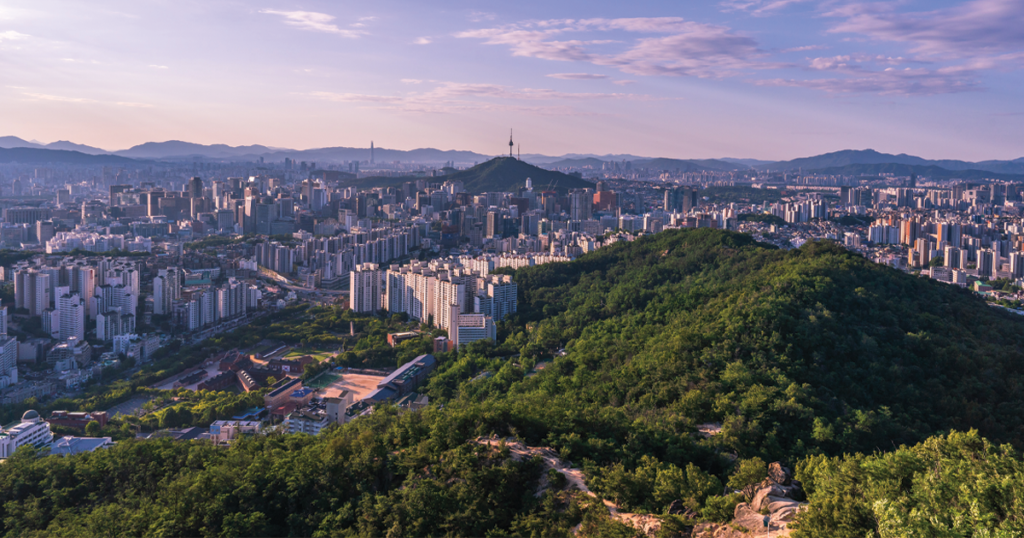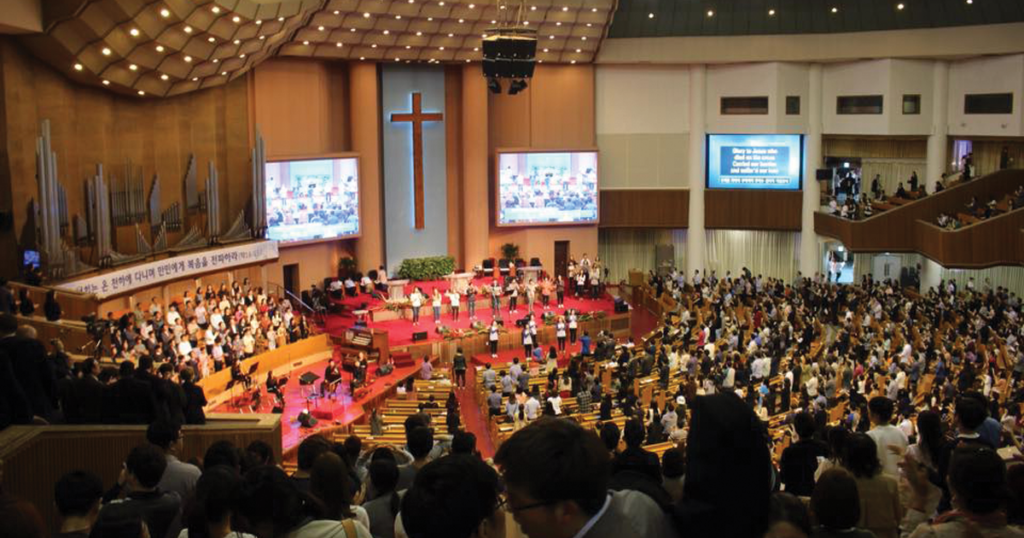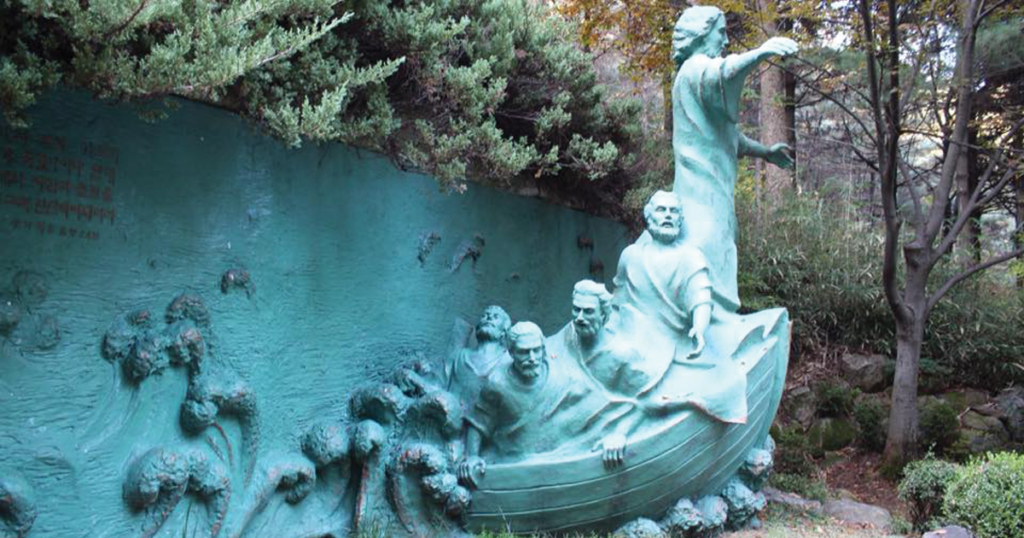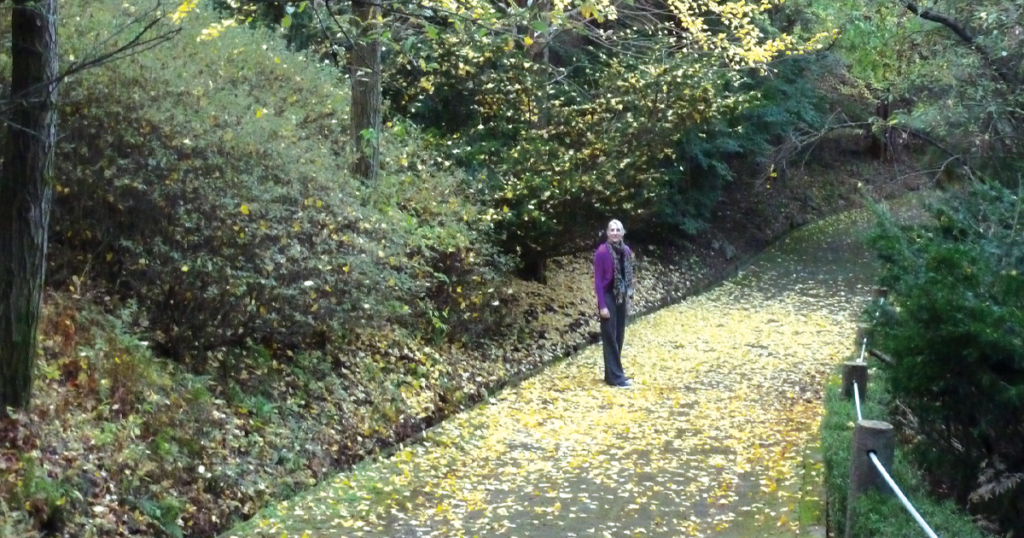The Easter Revolution
"We could all lay claim to the salvation won by Christ on the cross, on our behalf, in our place, by His blood."
Not exactly sure what part of the planet we were over, I opened the map on the seatback monitor in front of me. Flying out of Detroit, we were headed for Seoul with roughly seven hours left to go. Passing north of Alaska, I imagined what I might encounter on this journey to see the largest churches in the world. When I traveled to Korea in 2015, Kwanglim Methodist Church, the world’s largest Methodist church, claimed over 90,000 members. Yoido Full Gospel Church, the largest church in the world, had more than a million.
What we saw that week was more astonishing than I had imagined. More than 90 associate pastors, hundreds of weekly small groups, thousands gathering for one of the weekly Bible studies—and these numbers described just one of the churches we toured. At one of seven Sunday services at Yoido, 10,000 worshippers raised their hands and proclaimed together, “Lord, Lord, Lord!” before praying out loud simultaneously. The sound of their voices flooded the vast auditorium, cascading down from the balconies, drowning out all other noise. I experienced in Korea the local church on a colossal scale. And I did so with a group of students marked by an also astonishing degree of diversity. Though our school, Asbury Theological Seminary, was in a sleepy Kentucky town, members of our group came from around the US and world, like my roommate for the trip, a bishop in the Church of Nigeria.
Partway through our trip, we spent time at Osanri Prayer Mountain, a retreat center. Tucked away in mountains reminiscent of Appalachia back home, the center consisted of lodges, meeting rooms, youth camps, an artificial tubing hill (which we of course tested) and prayer closets. That last feature was an affecting space to see. With small, enclosed rooms large enough just for a single person to kneel, the instruction of Jesus to go to one’s closet and pray in secret was scrupulously realized here. Peering in past each open door, finding only a cushion on the floor and a cross on the wall, the palpable stillness one can sometimes feel in an empty chapel hovered. As night fell, we discovered it wasn’t unusual to see at any hour a lone silhouette enter that place. Witnessing their quiet, steadfast personal devotion to the Lord, the American experience of Christianity I thought to be central to the future of the faith became less so. Christianity doesn’t belong to one part of the world or another, but to us all.
Also at the campus was a prayer walk that snaked up switchbacks to the top of Prayer Mountain. With each turn, a large patinaed statue stood depicting a scene from the life and ministry of Jesus, culminating in the events of Holy Week. We had the opportunity to pray along this path, and at the top my roommate and I knelt to intercede for one another. I don’t know that such a small moment belongs in the pages of a magazine. But I found myself awestruck by how unlikely it all was—being here on the Korean peninsula, praying with a Nigerian bishop I just met, and him with a Salvationist from Florida. I heard the staccato sounds of his native Kafanchan dialect as he prayed for me and my family and wondered how such an improbable moment could have occurred at all.

In Seoul, our hosts presented an experience of the church that was simultaneously foreign and familiar—a perennial feature of a faith with an unrivaled capacity for assimilation and revolution, accommodation and rebirth. The historian Tom Holland, in his expansive book, “Dominion,” traces through Christian history the major revolutions unleashed by the gospel in the West and worldwide. Holland doesn’t provide a comprehensive history of Christianity, aiming to detail its development through the centuries. Instead, he shows how the basic features of modern life often taken for granted—like the existence of universal human rights, the impetus for continual social reform, the separation of the religious and the secular, monogamous marriage relationships, and so on—are not purely products of reason or philosophy, but of Christianity. In Holland’s view, “The West, increasingly empty though the pews may be, remains firmly moored to its Christian past.” And the rest of the world, having adopted such exports and others, is no less influenced by this Christian legacy. Indeed, while the letters BCE and CE may now be found in most textbooks, to date anything with “2024” is to still implicitly say we are “in the year of our Lord.”
This Easter, we find ourselves at the dawning of several supposed revolutions in spheres like medicine, energy, space travel or, most notably, artificial intelligence (AI). A man often called the godfather of AI, Geoffery Hinton, was recently asked if the AI revolution will be like the Industrial Revolution. Hinton, appearing a bit amused, replied, “I think it’s comparable in scale with the Industrial Revolution or electricity … maybe the wheel.” With his striking response, Hinton proposes that we are living in such a revolutionary time as to require us to look back more than 5,000 years to find a similar period. The change underway is positively fundamental. It is difficult to argue Hinton’s proposition when headlines chronicle just the beginning of this seismic event. Union strikes, congressional hearings, intellectual property disputes—faint tremors relative to what is promised to come as the boundary between man and machine shrinks with each new microchip. Yet, perhaps Hinton passed one even more gargantuan revolution when reaching back for one comparable.

While not occurring within the realm of technology, the Easter revolution, as described in Holland’s “Dominion,” ushered in change so foundational as to now be forgotten. “So profound has been the impact of Christianity on the development of Western civilization that it has come to be hidden from view. It is the incomplete revolutions which are remembered; the fate of those which triumph is to be taken for granted.” To the list of such effects above, one could also add the quality that perhaps more than any other upended the Greco-Roman context in which the spark of the Easter revolution was lit: “That the last shall be first and the first shall be last” (Matthew 20:16). Said differently by the Apostle Paul, “There is neither Jew nor Greek, there is neither slave nor free, there is neither male nor female; for you are all one in Christ Jesus” (Galatians 3:28-29 NASB). At Easter, the old order of things began to pass away. A new order of things based not in power, patronage or privilege had begun. The self-curvature of the human heart, what St. Augustine described as incurvatus in se, wrought by sin, was being washed away. Into the abyss of our selfishness and endless strife, a light from on high had broken upon us, opening the possibility that all people could finally be one.
The AI revolution will no doubt provide revolutionary improvements to productivity, efficiency and quality of life. Yet, the fears so many have about its possibilities remind us that there can be no moving beyond the need for Easter. The extent to which AI poses the threat of culminating in a Terminator-style apocalypse or any other undesirable outcome is the result of the threat posed to humanity by sin since the Fall. After all, AI, though through a dizzying array of algorithms making computations at lightning speed, simply mimics what we might say or do in a given scenario. It is, therefore, reasonable to anticipate that if we are fallen, the AI we create will be fallen too. Indeed, the human race might create robotic assistants, space colonies, alternative energy sources, DNA editing or any other new thing assumed now to be just over the horizon. But the world’s deepest need is for a new humanity, one baptized by the Spirit into the way of Jesus, the way of holy, selfless love.

As I climbed the walkway to the top of the mountain, the statues narrating the life of Jesus came to the story’s triumphant end. While moved by each depiction I saw, I felt a bit let down that Pentecost wasn’t also an included scene. Then the sidewalk ended and each of us continued up to see the view from the top.
It occurs to me now that Pentecost was actually present that day. As I knelt in prayer with my Nigerian brother while others from around the world at the top prayed as well, a depiction of Pentecost was all around. We could each testify that Jesus is truly mighty to save. We could all lay claim to the salvation won by Christ on the cross, on our behalf, in our place, by His blood. God’s Spirit had witnessed to our spirits that it was so. He had given us our second birth. He had made us, because of the unparalleled revolution of Easter, a new humanity. He had made us one.







